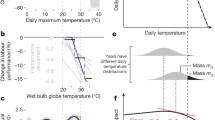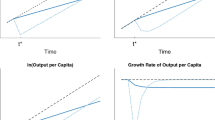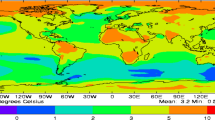Abstract
Hotter countries are poorer on average. This paper attempts to separate the historical and contemporaneous components of this income–temperature relationship. Following ideas by Acemoglu et al. (Am Econ Rev 91(5):1369–1401, 2001), we use colonial mortality data to account for the historical role of temperature since colonial mortality was highly correlated with countries’ average temperatures. The remaining income–temperature gradient, after colonial mortality is accounted for, is most likely contemporaneous. This contemporaneous effect can be used to estimate the consequences of global warming. We predict that a 1°C temperature increase across all countries will cause a decrease of 3.8% in world GDP. This prediction is robust across functional forms and an alternative method for separating historical effects.
Similar content being viewed by others
References
Acemoglu D, Johnson S, Robinson JA (2000) The colonial origins of comparative development: an empirical investigation. Working Paper 00-22, Department of Economics, MIT, September 2000
Acemoglu D, Johnson S, Robinson JA (2001) The colonial origins of comparative development: an empirical investigation. Am Econ Rev 91(5): 1369–1401
Acemoglu D, Johnson S, Robinson JA (2002) Reversal of fortune: geography and institutions in the making of the modern world income distribution. Q J Econ 117(4): 1231–1294
Acemoglu D, Johnson S, Robinson JA (2005) A response to Albouy’s ‘A reexamination based on improved settler mortality data’. Unpublished working paper, March 2005
Albouy D (2004) The colonial origins of comparative development: a reexamination based on improved settler mortality data. Unpublished working paper, Department of Economics, University of California, Berkeley, September 2004
Albouy D (2008) The colonial origins of comparative development: an investigation of the settler mortality data. NBER Working Paper #14130, June 2008
Bosello F, Roson R, Tol RSJ (2006) Economy-wide estimates of the implications of climate change: human health. Ecol Econ 58: 579–591
Chima RI, Goodman CA, Mills A (2003) The economic impact of malaria in Africa: a critical review of the evidence. Health Policy 63: 17–36
Choinière C, Horowitz JK (2006) A production function approach to the GDP-temperature relationship. Unpublished working paper
Curtin PD (1989) Death by migration: Europe’s encounter with the tropical world in the nineteenth century. Cambridge University Press, Cambridge
Curtin PD (1998) Disease and empire: the health of European troops in the conquest of Africa. Cambridge University Press, Cambridge
Dechênes O, Greenstone M (2007) The economic impacts of climate change: evidence from agricultural output and random fluctuations in weather. Am Econ Rev 97(1): 354–385
Dell M, Jones BF, Olken BA (2008) Climate change and economic growth: evidence from the last half century. NBER Working Paper #14132, June 2008
Diamond JM (1997) Guns, germs, and steel. W.W. Norton, New York
Easterly W, Levine R (2003) Tropics, germs, and crops: how endowments influence economic development. J Monet Econ 50: 3–39
Gallup JL, Sachs JD, Mellinger AD (1998) Geography and economic development. NBER Working Paper #6849, December 1998
Gutierrez H (1986) La Mortalite des Eveques Latino-Americains aux XVIIe et XVII Siecles. Ann Demogr Hist 29–39
Hall RE, Jones C (1999) Why do some countries produce so much more output per worker than others?. Q J Econ 114: 83–116
Kamarck A (1976) The tropics and economic evelopment. Johns Hopkins University Press, Baltimore
Maddison D, Manley M, Kurukulasuriya P (2007) The impact of climate change on African agriculture. Policy Research Working Paper #4306, The World Bank, Development Research Group, August 2007
Mankiw NG, Romer D, Weil D (1992) A contribution to the empirics of economic growth. Q J Econ 107: 407–437
Masters WA, McMillan MS (2001) Climate and scale in economic growth. J Econ Growth 6(3): 167–186
Mendelsohn R, Nordhaus W, Shaw D (1994) The impact of global warming on agriculture: a Ricardian analysis. Am Econ Rev 84(4): 753–771
Mendelsohn R, Basist A, Kurukulasuriya P, Dinar A (2007) Climate and rural income. Clim Change 81: 101–118
Nordhaus W (1994) Climate and economic development: climates past and climate change future. In: Proceedings of the world bank annual conference on development economics 1993. The World Bank, 1994
Nordhaus WD (2006) Geography and macroeconomics: new data and new findings. PNAS 103(10): 3510–3517
Quiggin J, Horowitz JK (1999) The impact of global warming on agriculture: a Ricardian analysis: comment. Am Eco Rev 89(4): 1044–1045
Quiggin J, Horowitz JK (2003) Costs of adjustment to climate change. Aust J Agric Res Econ 47(4): 429–446
Ram R (1997) Tropics and economic development: an empirical investigation. World Dev 25(9): 1443–1452
Ram R (1999) Tropics and income: a longitudinal study of the US states. Rev Income Wealth 45(3): 1–6
Sachs J (2003) Institutions don’t rule: indirect effects of geography on per capita income. National Bureau of Economics Research Working Paper 9490 (February 2003)
Schlenker W, Hanemann WM, Fisher AC (2004) The impact of global warming on US agriculture: an econometric analysis of optimal growing conditions. CUDARE Working Papers #1003, University of California, Berkeley
Theil H, Chen D (1995) The equatorial grand canyon. Economist 143(3): 317–327
Theil H, Finke R (1983) The distance from the equator as an instrumental variable. Econ Lett 13: 357–360
Theil H, Seale JL (1994) The geographic distribution of world income. Economist 142(4): 387–419
Tol RSJ (2002) Estimates of the damage costs of climate change. Environ Resour Econ 21: 47–73
Weitzman M (2009) On modeling and interpreting the economics of catastrophic climate change. Rev Econ Stat 91(1): 1–19
Author information
Authors and Affiliations
Corresponding author
Rights and permissions
About this article
Cite this article
Horowitz, J.K. The Income–Temperature Relationship in a Cross-Section of Countries and its Implications for Predicting the Effects of Global Warming. Environ Resource Econ 44, 475–493 (2009). https://doi.org/10.1007/s10640-009-9296-2
Received:
Accepted:
Published:
Issue Date:
DOI: https://doi.org/10.1007/s10640-009-9296-2




